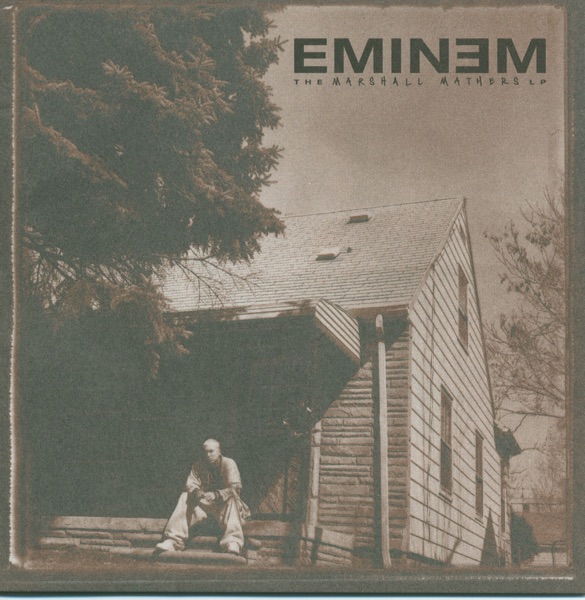The Marshall Mathers LP, by Eminem
Suggested by Jamie Walsh
I had trouble writing this.
I used to love Eminem. He spoke his mind. He took no prisoners. He didn’t care. It was refreshing, anarchic, taboo, and shocking. When he first arrived on the scene in 1999, I was twenty-five. I was single, and bored. Eminem was exciting, and fun.
I’m now forty-seven, with a very different life, and a different view on a lot of things. I don’t remember changing, but I can’t deny that I have changed. Before this project, I’d not listened to an Eminem album for at least fifteen years.
It’d be easy for me to rattle through this with my aged, jaded eyes. I could point out the hooks, decrying the prejudice or applauding the narrative as appropriate. But that would be a disservice, to the young twenty-five-year-old me and the old forty-seven year old me, as it wouldn’t be reflective of my thoughts as a whole.
If I were still the Young Me, I’d say that this album was excellent. Beginning with a no-compromise Public Service Announcement, and putting no punches throughout, The Marshall Mathers LP is a very real rollercoaster with vitriolic peaks and darkening devilish troughs. From the standout song Stan, a lyrical story of an obsessed fan murdering his girlfriend in perverse homage to his idol, to the disturbing Kim, a role-play in which the Marshal Mathers character has a blazing row with his wife Kim before violently ending her life with a mocking taunt.
The Young Me would praise Eminem’s lyrical mastery, laughing along with the subject matter in an ironic fashion. Because it’s just a character, right? Eminem’s doing it for shock value, it’s his schtick. None of it is real, it’s designed to rile people up and make them mad. Sure, he uses homophobic and misogynistic language, but if you accept that he’s serious about those views then it’s an extension of that thought to believe he longs to kill his wife and rape his mother and do all the other hideous, ridiculous things that he raps about on his records. And if you believe that, I’ve got some magic beans to sell you.
The Old Me would share some of the Young Me’s opinions. Stan is indeed the iconic standout, with Dido’s dreamy vocal adding emotional beef to the strong broth. The forty-seven-year-old me would still praise Eminem’s cultured rap palate, as the horrorcore chic is a departure from the get-money-cop-killing-gang-banging swinging dick energy that blights the medium like a locust cloud. But if asked about Eminem’s character, and intolerance, tawdry demeanour, the forty-seven-year-old me would give pause.
Because this album is not a pleasant piece. Every track, every skit, every phrase seems designed as shard of glass to the eyeball. It’s an onslaught, pure and simple. You can’t pause for breath or take a knee because the moment you do, you’re assailed by another shocking phrase or tawdry image. From the intense misogyny of the aforementioned Kim to the wildly inappropriate homophobia in skits like Ken Kaniff and songs like Marshal Mathers, the entire album is unconscionable conduct write large, in pen.
Bizarrely, the Old Me would also semi-handwave the misogyny away, as the face of that pernicious bullsh*t is all too wide and smiling in the rap game, and can be tackled with more guns and on more levels than this. The blatant homophobia is perhaps the more insidious transgression, as these words are clearly not those of a role-played character or puffed-up self-parody, and they are mirrored in Eminem’s interviews, and conduct, and general lifestyle. They are strictly unacceptable, and Eminem should own them, with all the consequences that entails.
The Young Me views the Old Me as a man who’s lost his senses of humour and perspective. These songs are blatantly tongue-in-cheek, high-camp theatre, as truly dangerous as lukewarm Horlicks. If Old Me has fallen for the hype, that’s on him. The Old Me views the Young Me as rather naïve, latching onto the crass in a futile attempt to forge a sense of self-relevancy.
Both versions of me feel that censorship is not an option, of course. The right to say such things in indelible. The difference is that the Old Me believes that although freedom of speech is paramount, there are real consequences to speaking your mind, while the Young Me feels that the act of speaking freely is a victory in itself. Both views have arguments for and against, and I feel my own internal conflicts will not be resolved in a review of a twenty-year-old rap album.
Eminem is polarising, but in the end It boils down to this: I want to love this record because it’s a rapping tour de force, and I want to hate this album because it’s septic, intolerant bile. As for a score, I’m holding up a hand and taking the coward’s way out with a lacklustre 5/10, though I suspect the nays will have it in the long run. Either way, my perfect study in fence-sitting is designed to offend no-one, which I feel misses the point in spectacular fashion.
